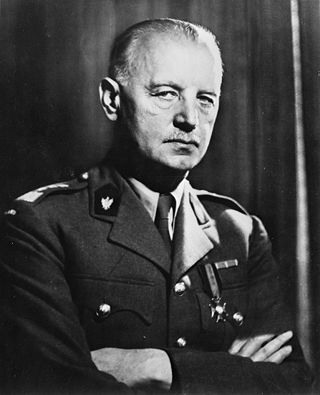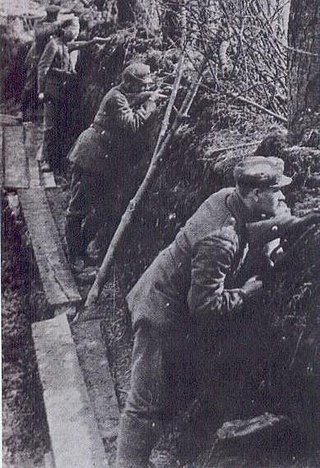
The history of Poland spans over a thousand years, from medieval tribes, Christianization and monarchy; through Poland's Golden Age, expansionism and becoming one of the largest European powers; to its collapse and partitions, two world wars, communism, and the restoration of democracy.

Józef Klemens Piłsudski was a Polish statesman who served as the Chief of State (1918–1922) and first Marshal of Poland. In the aftermath of World War I, he became an increasingly dominant figure in Polish politics and exerted significant influence on shaping the country's foreign policy. Piłsudski is viewed as a father of the Second Polish Republic, which was re-established in 1918, 123 years after the final partition of Poland in 1795, and was considered de facto leader (1926–1935) of the Second Republic as the Minister of Military Affairs.

The Battle of Warsaw, also known as the Miracle on the Vistula, was a series of battles that resulted in a decisive Polish victory in 1920 during the Polish–Soviet War. Poland, on the verge of total defeat, repulsed and defeated the Red Army.

The Polish–Soviet War was fought primarily between the Second Polish Republic and the Russian Soviet Federative Socialist Republic before it became a union republic in the aftermath of World War I and the Russian Revolution, on territories which were previously held by the Russian Empire and the Habsburg Monarchy following the Partitions of Poland.

Władysław Eugeniusz Sikorski was a Polish military and political leader.

The Treaty of Riga was signed in Riga, Latvia, on 18 March 1921 between Poland on one side and Soviet Russia and Soviet Ukraine on the other, ending the Polish–Soviet War (1919–1921). The chief negotiators of the peace were Jan Dąbski for the Polish side and Adolph Joffe for the Soviet side.

Roman Stanisław Dmowski was a Polish politician, statesman, and co-founder and chief ideologue of the National Democracy political movement. He saw the Germanization of Polish territories controlled by the German Empire as the major threat to Polish culture and therefore advocated a degree of accommodation with another power that had partitioned Poland, the Russian Empire. He favoured the re-establishment of Polish independence by nonviolent means and supported policies favourable to the Polish middle class. While in Paris during World War I, he was a prominent spokesman for Polish aspirations to the Allies through his Polish National Committee. He was an instrumental figure in the postwar restoration of Poland's independent existence. Throughout most of his life, he was the chief ideological opponent of the Polish military and political leader Józef Piłsudski and of the latter's vision of Poland as a multinational federation against German and Russian imperialism.

Ryszard Jerzy Kukliński was a Polish colonel and Cold War spy for NATO. He was posthumously promoted to the rank of brigadier general by Polish President Andrzej Duda. Kukliński passed top secret Soviet documents to the CIA between 1972 and 1981, including the Soviet plans for the invasion of Western Europe. The former United States National Security Advisor Zbigniew Brzeziński described him as "the first Polish officer in NATO."

Marshal Edward Rydz-Śmigły, also called Edward Śmigły-Rydz, was a Polish politician, statesman, Marshal of Poland and Commander-in-Chief of Poland's armed forces, as well as a painter and poet.

Intermarium was a post-World War I geopolitical plan conceived by Józef Piłsudski to unite former Polish–Lithuanian Commonwealth lands within a single polity. The plan went through several iterations, some of which anticipated the inclusion of neighbouring states. The proposed multinational polity would have incorporated territories lying between the Baltic, Black, and Adriatic Seas, hence the name Intermarium.

The 1920 Kiev offensive was a major part of the Polish–Soviet War. It was an attempt by the armed forces of the recently established Second Polish Republic led by Józef Piłsudski, in alliance with the Ukrainian People's Republic led by Symon Petliura, to seize the territories of modern-day Ukraine which mostly fell under Soviet control after the October Revolution as the Ukrainian Soviet Socialist Republic.
The Polish–Soviet War erupted in 1919 in the aftermath of World War I. The root cause was a territorial dispute dating back to Polish–Russian wars in the 17–18th centuries. At that time both countries had just undergone transition: in 1918 Poland reclaimed independence after 123 years of partitions. In 1917 the October Revolution replaced the liberal, democratic Provisional Government, that had previously displaced the Tsar in Russia, with Soviet rule. The war ended with the Treaty of Riga in 1921, which settled the border issue and regulated Polish-Soviet relations until the German invasion of Poland in 1939.

The Polish Military Organisation, PMO was a secret military organization that was formed during World War I (1914–1918). Józef Piłsudski founded the group in August 1914. It adopted the name POW in November 1914 and aimed to gather intelligence and to sabotage the enemies of the Polish people. Piłsudski used it to act independently from his cautious Austro-Hungarian supporters, and it became an important, if somewhat lesser known, counterpart to the Polish Legions. Its targets included the Russian Empire in the early phase of the war and the German Empire later. Its membership rose from a few hundred in 1914 to over 30,000 in 1918.
Prometheism or Prometheanism was a political project initiated by Józef Piłsudski, a principal statesman of the Second Polish Republic from 1918 to 1935. Its aim was to weaken the Russian Empire and its successor states, including the Soviet Union, by supporting nationalist independence movements among the major non-Russian peoples that lived within the borders of Russia and the Soviet Union.

The Battle of Kostiuchnówka was a World War I battle that took place July 4–6, 1916, near the village of Kostiuchnówka (Kostyukhnivka) and the Styr River in the Volhynia region of modern Ukraine, then part of the Russian Empire. It was a major clash between the Russian Army and the Polish Legions during the opening phase of the Brusilov Offensive.

The Treaty of Warsaw of April 1920 was a military-economical alliance between the Second Polish Republic, represented by Józef Piłsudski, and the Ukrainian People's Republic, represented by Symon Petliura, against Bolshevik Russia. The treaty was signed on 21 April 1920, with a military addendum on 24 April.

Żeligowski's Mutiny was a Polish false flag operation led by General Lucjan Żeligowski in October 1920, which resulted in the creation of the Republic of Central Lithuania. Józef Piłsudski, the Chief of State of Poland, surreptitiously ordered Żeligowski to carry out the operation, and revealed the truth only several years afterwards.

Wacław Lipiński (1896–1949) was a Polish historian, military officer and resistance fighter, lieutenant colonel in the Polish Army of the Second Polish Republic, recipient of Polish highest military decoration, the Order of Virtuti Militari.

Ignacy Hugo Stanisław Matuszewski was a Polish politician, publicist, diplomat, Minister of Finance of the Second Polish Republic, colonel, infantry officer and intelligence agent of the Polish Army, member of the International Olympic Committee. A strong supporter of Józef Piłsudski, he was counted among the "Colonels" and co-founded the Józef Piłsudski Institute of America.
Natalie Grant Wraga was a historian, scholar, and an expert on Soviet Union deception practices.

















